Carla Rice’s research is community engaged and oriented, reflecting her passions for bringing diverse groups together and creating welcoming spaces and meaningful relationships that foster personal and social change.
In her scholarship she strives not only to engage community but further, to create community with previously dis-enfranchised and dis-placed individuals. These include members of groups historically excluded from community, such as:
Thus, at its core, her Canada Research Chair is centrally about community, about theorizing the significance of community, and about studying innovative ways of building community.
In this, she emphasizes arts-informed participatory research methods and knowledge mobilization as potentially efficacious ways of engaging, creating, and extending community in order to
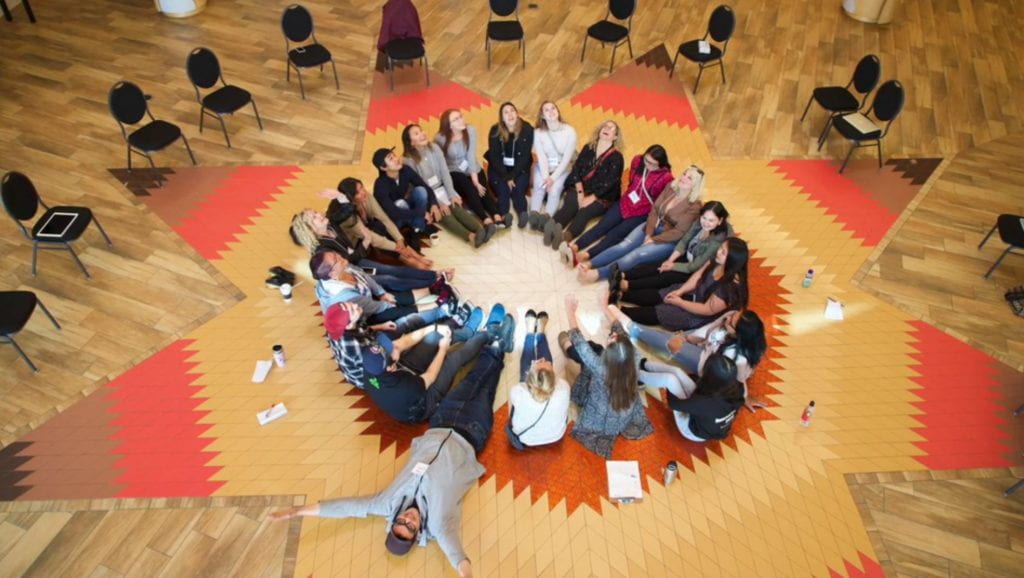
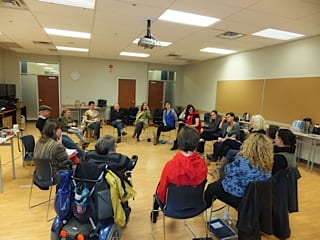 Community Engagement
Community EngagementResearch | Service
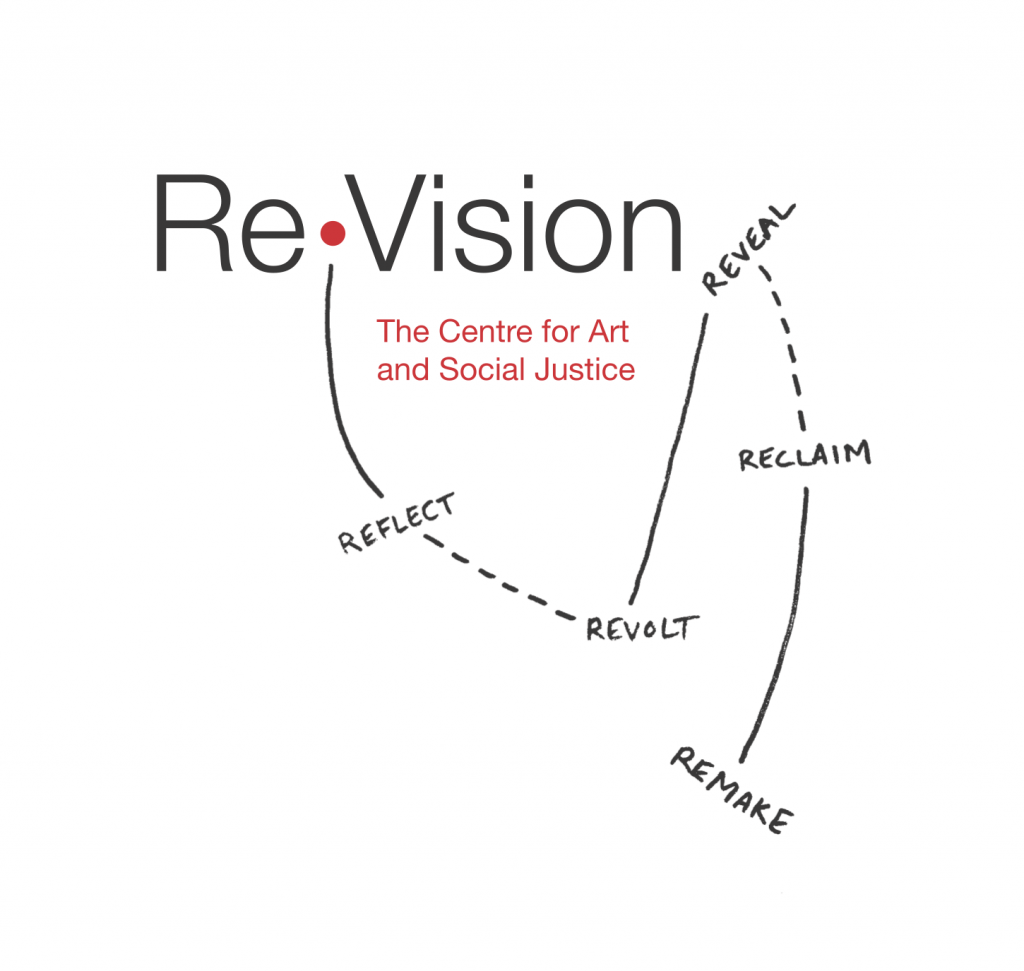
In her position as CRC in Care, Gender, and Relationships, Carla founded Re•Vision: The Centre for Art and Social Justice, a mobile media lab and expressive arts institute dedicated to exploring ways that communities can harness the power of the arts to advance social well-being, inclusion, and justice. In broad strokes, the Re•Vision Centre looks at the power and efficacy of the arts, and specifically of storytelling, to positively influence practitioners and decision makers in diverse sectors, including health care, education business and the arts.
This research project uses art and digital storytelling to mobilize knowledge from De-colonizing Our Schools (2010), a report that detailed barriers to Aboriginal student success in urban schools. Phase One of the project invited students and teachers to make digital stories about their experiences, and Phase Two involved an art exhibition at the John B. Aird Gallery in the MacDonald Block of provincial legislature in Toronto featuring the digital stories along with the work of urban Aboriginal artists. The exhibition created a space where Aboriginal and non-Aboriginal community members could meet and open possibilities for dialogue. This highly successfully event attracted over 500 visitors including the Provincial Minister of Aboriginal Affairs, the Director of the Toronto District School Board, and policy makers in the Ministry of Education.
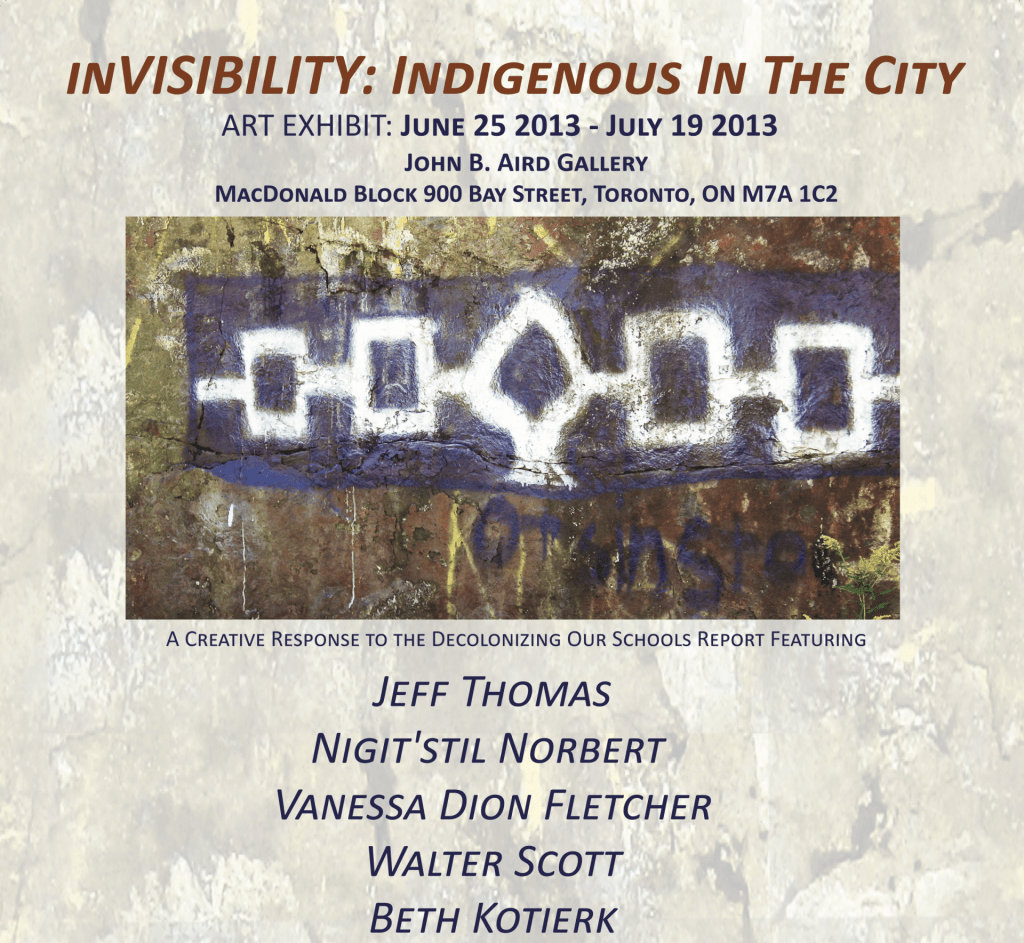
This “research as social change” project was developed as a collaborative partnership between health and social service sectors and academic institutions across Ontario. The collaborative includes the Peterborough YWCA, the Sudbury YWCA, Women’s Studies Program at Trent University, Women with Disability and Deaf Women’s Project at Springtide Resources in Toronto, the Women’s Health Research Institute at University of Toronto, and the New Women’s College Hospital. The primary purpose of the proposed initiative was to understand how arts-based research could generate positive, health promoting conditions for women living with disabilities and differences. A secondary purpose was to explore the potential of creative methods to engage health and social service providers in revisioning meanings of body differences interwoven throughout health materials and care milieus.
Developed a program addressing the continuum of body image problems. The project provided: counselling services for girls/women with weight and non-weight related body image concerns; intensive clinical training for master’s and doctoral students in nursing, psychology, social work, and women’s studies; clinical supervision to family physicians and women’s health scholars; consultation to professional and community groups; research on body image across the life span; and new project development, including initiatives for women with physical differences and disabilities. Established a unique counselling model to meet gaps in services, drawing from feminist and postmodern psychologies. Developed proposals and worked with Women’s College Hospital Foundation to raise funds for program implementation. May 1992 – August 2005.
Developed a project addressing issues related to everyday experiences in social interactions of women living with disabilities and facial/physical differences. Conducted interviews to determine community needs, forged partnerships with key organizations to develop project idea, and wrote funding proposals to pilot the project. Supervised creation and implementation of a counselling method using feminist and narrative psychology. Developed art and storytelling workshops for women with facial and physical differences and disabilities focusing on creating identities incorporating physical difference or disability into a positive sense of self. Supervised a research project on body image and facial difference across the life span and on the experiences of people with physical differences and/or disabilities in the health care system. Received various grants, including $200,000 in Trillium funding. June 1997 – August 2005.
Researched and co-authored “Mainstreaming Body Equity,” a report on developmental and sociocultural processes influencing the emergence of body image dissatisfaction and eating problems in 4 to 14-year-old girls. Made recommendations for development of body image curriculum, teacher training, parental education and extracurricular school activities across the elementary panel. Sat on an advisory committee consulting on implementation of the project. July 2001 – September 2002.
Planned, developed and administered a grant for a theatre project on body image. The project was implemented in 18 schools in the West End of Toronto, and included theatre production, curricula for teachers, and handouts for students and parents. Over 3000 students who saw the production were given pre-performance and post-performance lessons and questionnaires. Conducted a quantitative evaluation of the project, with 1000 students responding. April 1995 – August 1998.
Planned and developed workshops for the Community Health Division of the British Columbia Ministry of Health. Wrote a report documenting conference proceedings, provided a literature review of prevention research; assisted in the development of a provincial policy framework for promoting healthy body image and preventing eating disorders; assisted in the development of a provincial response strategy; and created a tool for evaluating existing prevention materials and projects. September 1996 – November 1996.
Planned and developed workshops for the Best Start Healthy Babies Demonstration Project in conjunction with the Health Communication Unit at the Centre for Health Promotion, University of Toronto. Wrote a manual addressing low birthweight, pregnancy, and body image issues and focusing on communication strategies to promote healthy body image in women of childbearing age. The workshop training and follow-up manual were designed to assist Best Start staff and other community groups in developing communication campaigns to address body image problems among pre-conceptional women. Provided consultation with communities in the Sault Saint Marie and Barrie areas (including local aboriginal communities) regarding future planning to mobilize the community around body image concerns and low birthweight. October 1993 – February 1995.
Facilitated the development of a body image working group through the former Toronto Board of Education and chaired the initiative. Assisted in the recruitment of student program and curriculum consultants to sit on the advisory committee, representing art, health, women’s studies, race relations, history, science, and family studies. Piloted body image support groups for young women, delivered professional development workshops for teachers, guidance counselors and other personnel, ran a lecture series for staff, and organized teachers to develop and test new curriculum ideas. June 1992 – August 1996.
Researched and wrote a comprehensive position paper on mental health reform from the perspective of women. The report was designed to provide a social understanding of women’s mental health problems, and included an alternative vision of women’s mental health, an analysis of the social realities of women’s mental health problems, and women’s relationships to the mental health system. The report was also developed as a feminist response to “Putting People First,” a plan for mental health reform developed by the Ministry of Health. October 1993 – April 1994.
Developed public relations and fund-raising initiatives for a community-based organization committed to reducing the incidence of child sexual abuse and improving system responses to sexually abused children. Conducted a consultation process to determine the funding needs and resources of the organization. Set-up a data base with over 100 potential funding bodies, developed proposals and letters of inquiry, and computerized fund-raising efforts. Designed promotional and educational materials such as an agency brochure. Assisted in the development of initiatives and projects for the primary prevention of child sexual abuse. January 1992 – April 1992.
Coordinated a national prevention and health promotion service committed to increasing public awareness of eating disorders. Designed and implemented innovative programs such as specialized workshops for educators, health care workers, and consumers, and campaigns such as Eating Disorder Awareness Week. Conducted assessment of community needs through consultation with consumers and community groups to develop programs to meet gaps in service provision. Determined agency directions through conducting planning sessions, setting organizational goals, and evaluating program objectives. Created innovative programming using a unique, women-centered approach to prevention. Administered an annual budget of $140,000, a paid staff of three and volunteer staff of ten. March 1989 – November 1991.
Coordinated a national public education campaign to increase awareness of the causes of eating disorders. Established a national steering committee of concerned health professionals and activists across Canada to act as spokespersons and organize local events. Assisted in mobilizing resources throughout the country to promote participation in all regions. Set up a local advisory committee of consumers and organizations to consult on promotion campaigns and strategies to reach target groups. Organized and coordinated local community events, such as theatre and film nights, open forums, workshop series, speak outs, and conferences. Developed and implemented a national media campaign. Raised funds for special Awareness Week events and promotional materials. Transformed the week from a local effort to an international campaign. March 1989 – November 1991.
Please note: This is not an exhaustive list.
Carla conducted numerous workshops for organizations including:
Carla participated in interviews with radio, print, and television media including:

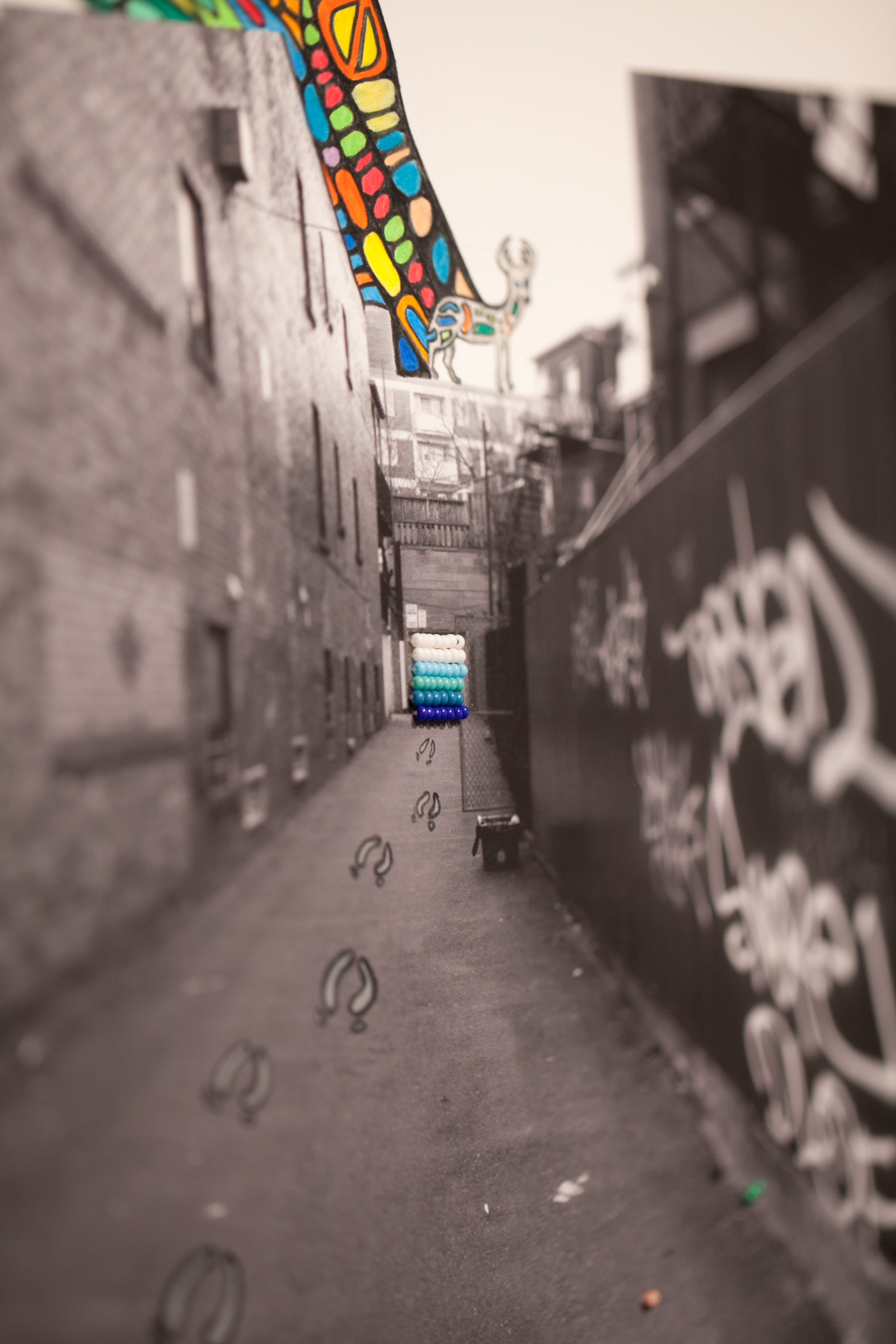 Creative / Artistic Works
Creative / Artistic WorksStorytelling | Films | Exhibitions
In this short film, Carla explores her embodied subjectivity as process, reflecting on her body history and aging body. Through this accounting, twinned notions of aging as decline or defiance and of disability as overcoming or eradication are shifted through their co-presence. Co-presencing narratives that are at odds with one another against the backdrop of visual images that depict the abject in highly sensuous ways might ‘crip’ aging, she suggests, by celebrating the very bodily signs that violate norms governing bodies. [6m44s]
In this short film, Carla examines colonization as difficult knowledge for settlers in Canada. Since the legacies of colonial histories reverberate in our settler colonial society, Carla traverses her own fractured Indigenous/non-Indigenous family relations in an attempt to unsettle settlers’ attachment to the land and to question how it might be possible to cleave new relations, both personal and political, between Indigenous and non-Indigenous people in Canada. [6m25s]
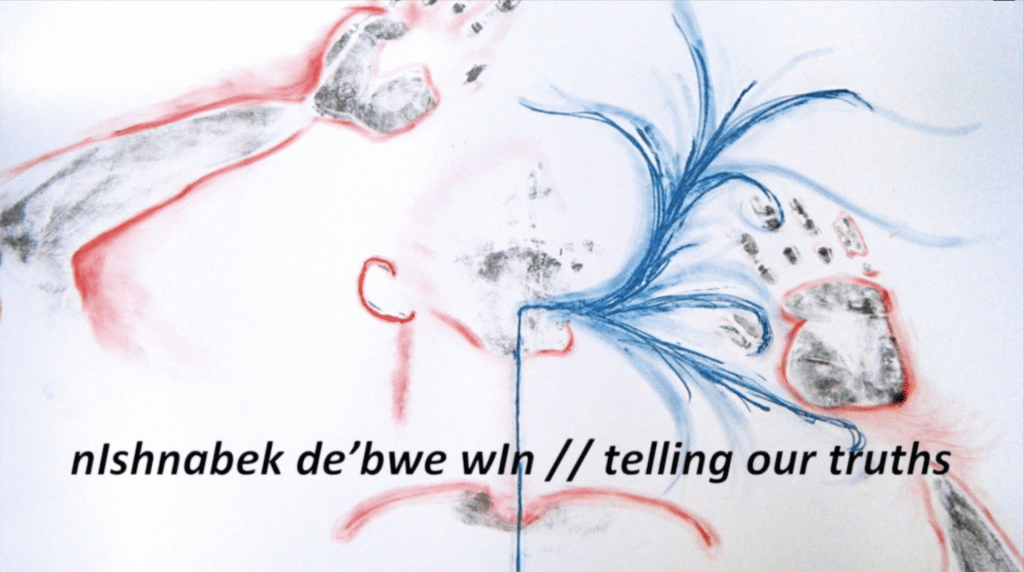
Produced 40 digital stories with Aboriginal students, teachers, parents, and artists in collaboration with 3 school boards in South Central Ontario on decolonizing and indigenizing schools. These have been screened in schools and boards throughout the years.
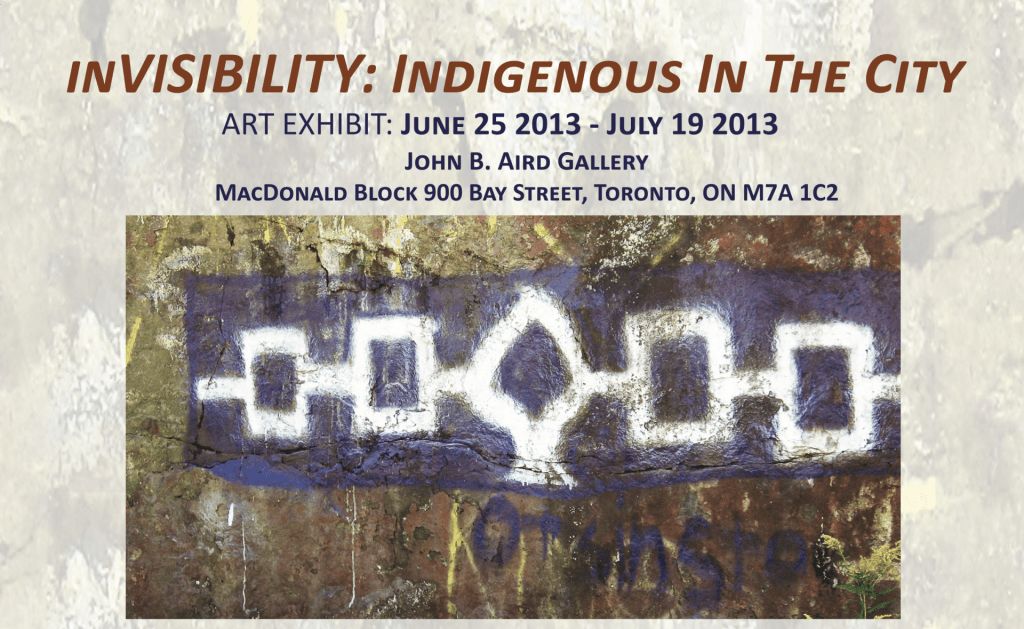
Produced 20 digital stories with Aboriginal students, teachers, parents, and artists in collaboration with the Aboriginal Education Centre at the Toronto District School Board on decolonizing and indigenizing schools, shown at the John B. Aird Gallery, MacDonald Block, Toronto, ON.
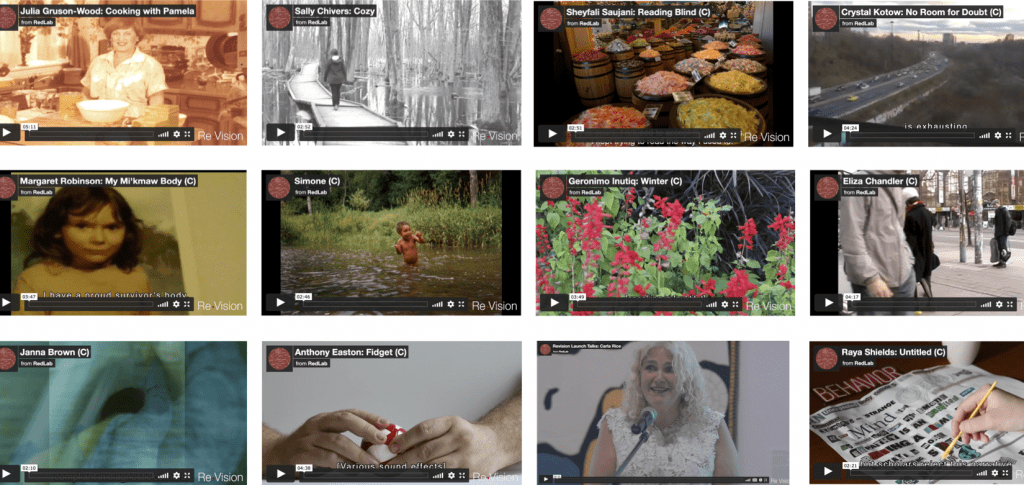
Produced over 500 short films with people with disabilities (artists & non-artists). Some themes covered include perceptions and experiences of bodily differences, sexuality and disability, disability and workplace accommodation, cultural and medical representations, technologies and health care spaces, interactions with care providers, self-reflectivity, and responses to difference.
As a result of participating in a 3-day conference on digital storytelling, Carla made a short autobiographical film based on her body image research using state-of-the-art video editing software and digital sound equipment. She uses the “Elephant in the Room” in presentations and trainings with academics and health providers to highlight the uses of self-reflexivity in health research and practice.
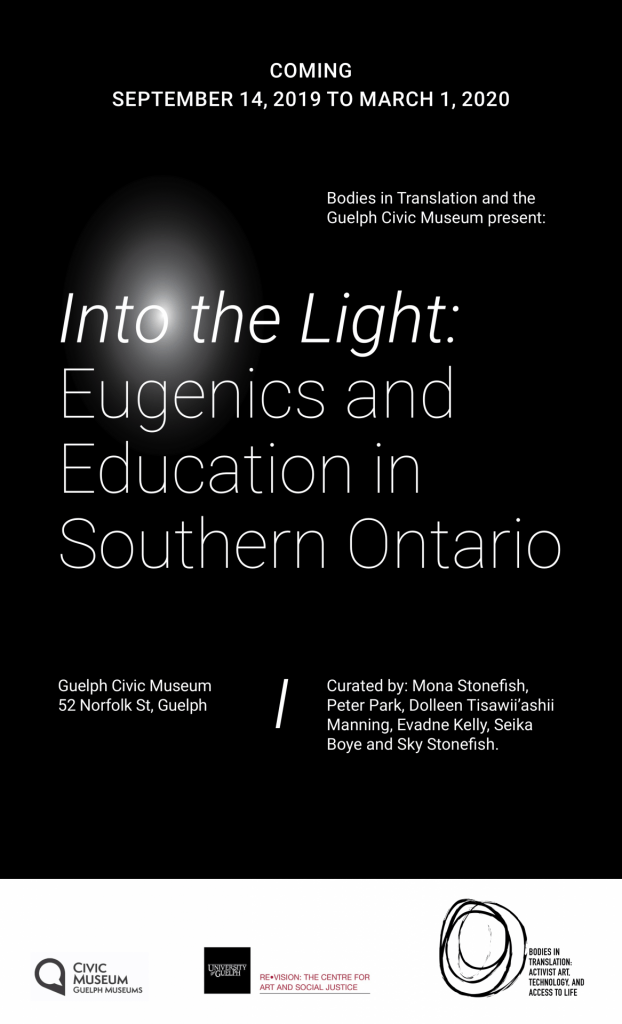
Into the Light is an exhibition at Guelph Museums, in collaboration with Re•Vision: The Centre for Art and Social Justice/Bodies in Translation, that brings the histories and experiences of eugenics to light. The exhibition has preserved and protected the stories of survivors of eugenic practices, and uncovered evidence of eugenics in education found in university archives. Into the Light situates individuals with lived experience at the forefront and turns over museum space to tell these stories. The museum provides the space and acts as liaison between voices that have been marginalized from the broader community. Substantial efforts have been made to ensure that the exhibition is accessible, including use of plain language, American Sign Language interpretation at events, captioning and transcripts of audio components, and narrative audio description. Its curators hope that Into the Light will inspire future examination and scholarship regarding the issue of eugenics and other difficult histories.
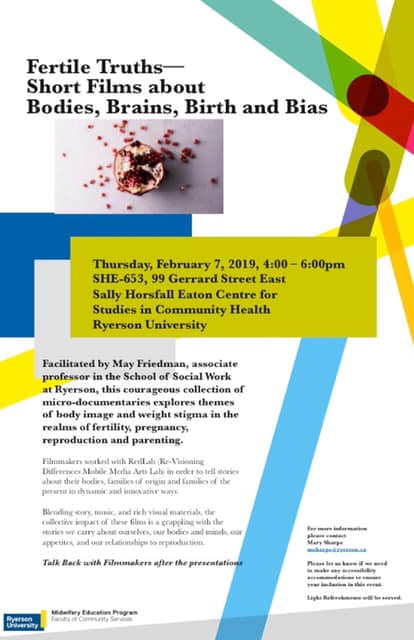
For the Guelph Film Festival. Curated screening of nine short micro-documentaries created by women and exploring themes of body image and weight stigma in the realms of fertility, pregnancy, reproduction and parenting. Produced by The Re•Vision Centre for Art and Social Justice.
Co-Curated screening, featuring eleven short videos created by women living with disabilities and embodied differences. Produced by Project Re•Vision.
Screened 20 digital stories on the experiences of youth and family members of African and European descent and health care providers on pathways to care following first episode psychosis. Produced by Project Re•Vision partnership with the Centre for Addiction and Mental Health.
Screened 15 digital stories produced by Project Re•Vision for inVisibility: Indigenous in the City at the Toronto District School Board of Trustees’ Session.
A screening of 12 digital stories produced by Project Re•Vision in Partnership with Tangled Art + Disability, launched at the Toronto International Film Festival.
Curated a film screening and panel by, for, and about diverse girls and women that invited audiences of girls/young women to reflect on the many messages they receive in daily life. Eight short films made by girls and women including those of different racial and ethnic backgrounds, with and without disabilities, and of varying body sizes, were shown. The filmmakers spoke on how girls might use filmmaking and cultural production to “talk back” to ideal images of beauty and stereotypes about their bodies and lives. Produced by Project Revision.
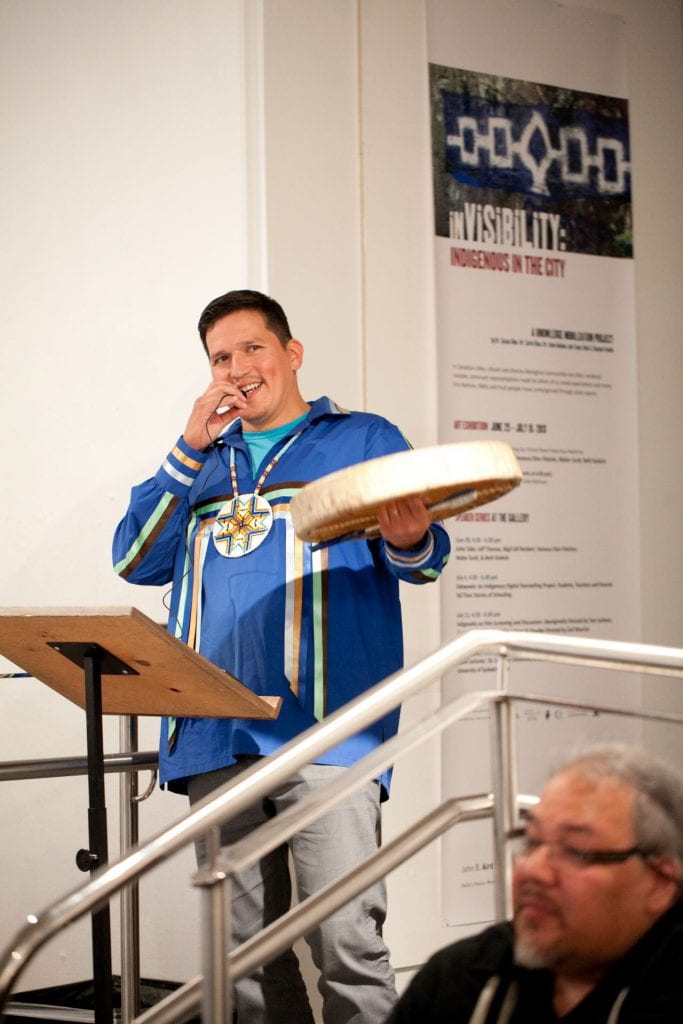
inVISIBILITY: INDIGENOUS IN THE CITY used art and digital storytelling to mobilize knowledge from De-colonizing Our Schools (2010), a report that detailed barriers to Aboriginal student success in urban schools. Phase One of the project invited Aboriginal students and parents as well as Aboriginal and non-Aboriginal teachers to make digital stories about their schooling experiences, and Phase Two entailed a three-week art exhibition featuring the digital stories along with the work of urban Aboriginal artists at the John B. Aird Gallery located in the MacDonald Block of the provincial legislature in Toronto. The exhibition created an indigenized space within the gallery where Aboriginal and non-Aboriginal community members could meet and open possibilities for dialogue and learning across differences. This highly successfully event attracted over 500 visitors including the Provincial Minister of Aboriginal Affairs, superintendents from the Toronto District School Board, and policy makers in the Ministry of Education. InVISIBILITY represented a collaboration effort between REDLAB/Project Re•Vision, Dr. Susan Dion and Dr. Anna Hudson from York University, and Tanya Senk and Hannah Fowlie from the Aboriginal Education Centre at the Toronto District School Board. Produced by Re•Vision.
A screening of 8 films focused on themes of accessibility and social inclusion. Films and panel produced by Project Re•Vision.
Produced and screened films made by and about bodies of differences. The representational history of disabled people can largely be characterized as one of being put on display or hidden away. Disabled bodies have been, and continue to be, displayed in freak shows, medical journals, charity campaigns, and as evil or pitiable tropes in novels and films. At the same time, disabled people have also been hidden in institutions, hospitals, group homes, and generally removed from the public eye. In all of these ways, the disabled body has been stolen; disabled people have lost control over the representation of disability. However, as Eli Clare tells us, “just as the disabled body has been stolen, it can also be reclaimed”. These ten short films are indicative of the fierce way women with disabilities and differences talk back to cultural expectations for disability by creating our own representations. The digital stories were completed by the participants themselves in one weekend for Project Re•Vision, a University of Guelph initiative. The films will be followed by a Q & A with the Project Director, Carla Rice, and the filmmakers present.
Carla also provides consultations for television, theatre, film, video and art projects including:
“Runaway Lane” (a play for adolescents on eating problems)
“Ready or Not” (a Global Television Network production)
“Fed-up” (a self-help book for women wanting to overcome food and weight preoccupation)
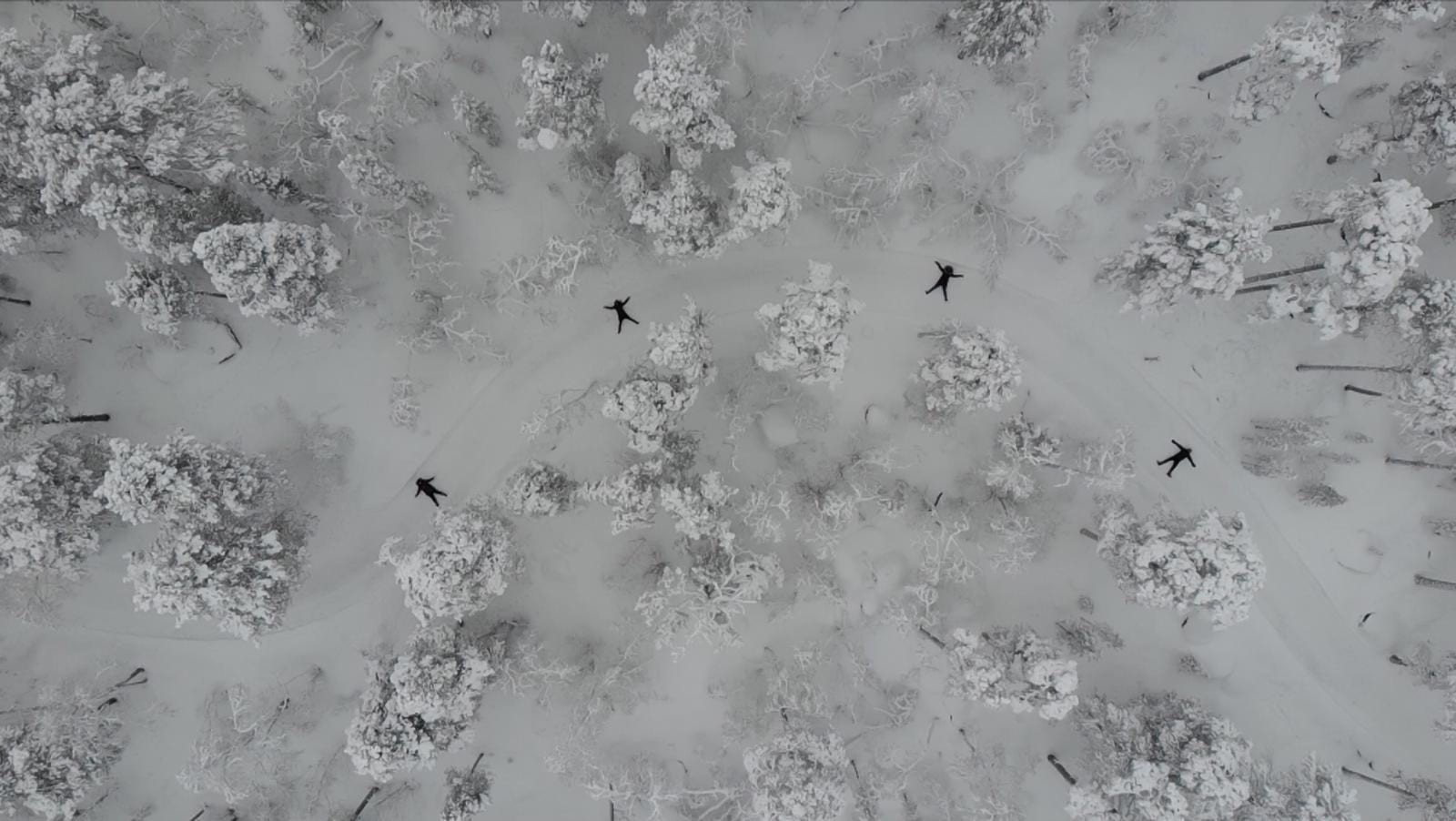
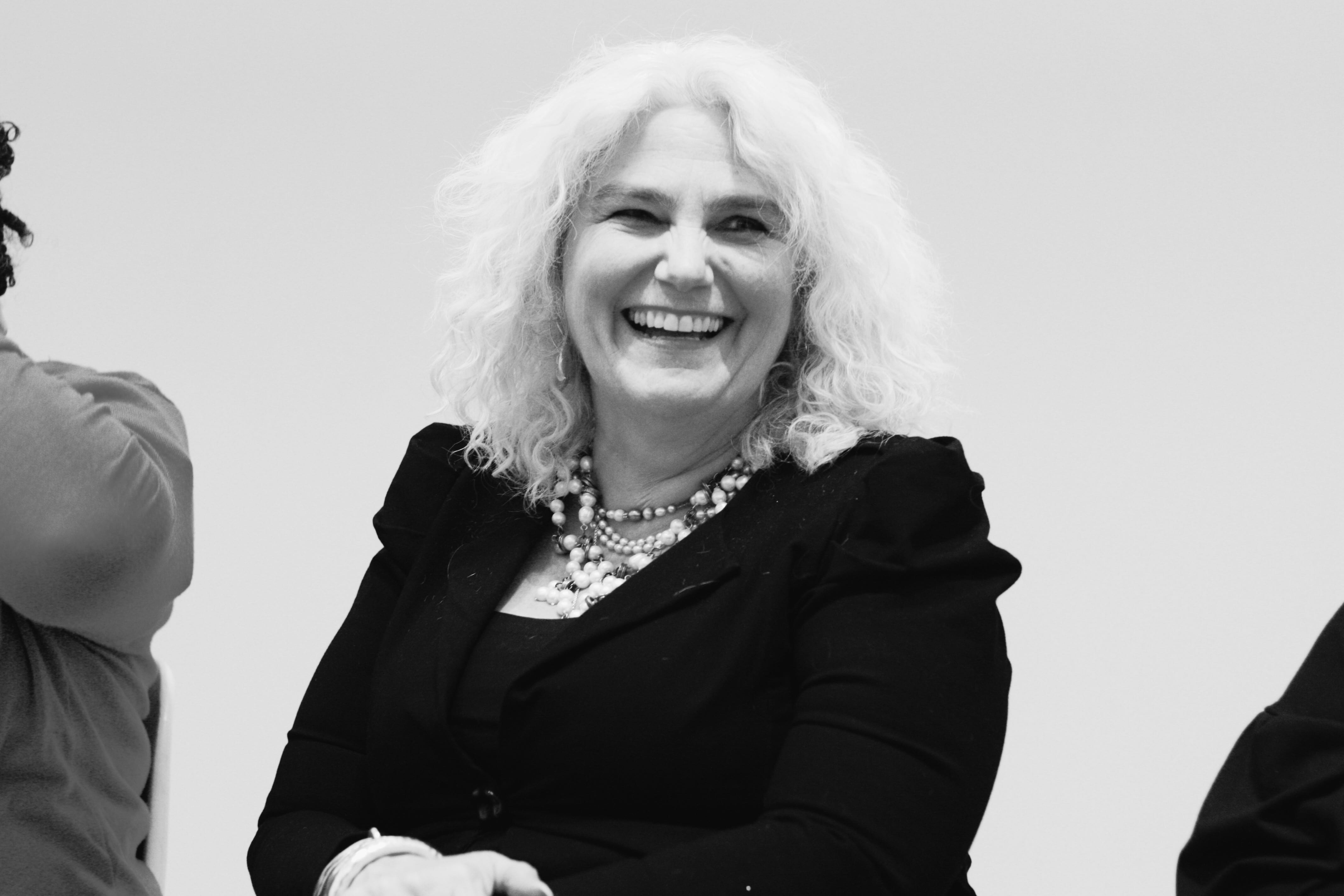 Past Consultation & Clinical Practice Up To 2010
Past Consultation & Clinical Practice Up To 2010Body Image | Eating Disorders
Designed and developed a keynote presentation to foster an honest dialogue between girls, mothers, and adult mentors focusing on girls’ body images experiences, issues and challenges. November 2008.
Developed and delivered two training seminars: Creating Body Positive Communities and Challenging Disordered Eating Practices. The first explore cultural trends in body image and eating problems and examined interventions found to be effective in promoting healthy bodies and communities. The second used narrative-informed ways of working to focus on how families and professionals could support people living with eating disorders to challenge disordered eating practices. October, 2008.
Designed and developed workshops and keynote presentations looking at girls’ body drama – their experiences, issues, challenges, and solutions – specifically focused on new media marketing trends of selling idealized and sexualized bodies to tween girls. April and May 2008.
Provided facilitation and consultation on the development of responses to girls in their transition from childhood to adolescence, specifically the pressures high-risk girls confront concerning their developing bodies, sexualities and identities. Facilitated a half-day workshop on the development of an action plan. May 1998.
Provided facilitation and consultation on the development of a community resource centre for the prevention of body image problems and eating disorders. Facilitated a one-day workshop on the development of an action plan. March 1997.
Provided consultation on the development of community responses to body image problems and eating disorders. Facilitated a half-day workshop on the development and implementation of new approaches to health promotion and prevention programming. March 1997.
Provided consultation on the development of community responses to body image problems and eating disorders. Facilitated a one-day workshop on the development and implementation of new approaches to health promotion and prevention programming. February 1997.
Provided consultation on the development of community responses to body image problems and eating disorders. Facilitated a one-day workshop on the development and implementation of health promotion and prevention programming. October 1996.
Provided consultation on the development of coordinated and systemic responses to body image problems and eating disorders. Facilitated a one-day workshop on the development, implementation and evaluation of health promotion and prevention programs. October 1996.
Provided consultation on the development of coordinated and systemic prevention responses to body image problems and eating disorders. Facilitated half workshop on the development and implementation of new health promotion and prevention programs. October 1996.
Provided consultation on the development of community responses to body image problems and eating disorders. Facilitated a one-day workshop on the development and implementation of health promotion and prevention programming as well as counselling approaches and strategies. September 1995.
Provided consultation on the development of community responses to the continuum of body image problems. Facilitated a two-day workshop on the development and implementation of health promotion and prevention programming as well as counselling approaches and strategies. February 1995.
Provided consultation on the development of community responses to the continuum of body image problems. Facilitated the development and implementation of health promotion and prevention programming. January 1995.
Provided consultation on the development of community responses to the continuum of body image problems. Facilitated the development and implementation of curriculum as well as health promotion and prevention programming for educators. Wrote a report documenting the planning of workshop participants. October 1994 – March 1995.
Provided consultation on the development of body image and weight preoccupation programs for school boards and local agencies. Facilitated the development and implementation of health promotion and prevention.
Consulted on the development of body image and weight preoccupation resources for children and youth. Assisted in planning and provided resources to facilitators, teachers, community workers and others. March 1993.
Provided consultation on the development of body image and weight preoccupation resources for children and youth. Assisted in planning a community network and provided resources to facilitators, teachers, community workers and others. March 1993.
Provided consultation on the development of body image and weight preoccupation groups for young women and girls with eating/weight struggles. Assisted in planning and resource development with group facilitators. February/March 1993.
Provided consultation on the development of body image and weight preoccupation groups for women with eating/weight struggles. Assisted in planning and resource development with group facilitators. September 1992.
Provided consultation on the development of a body image group for women with eating problems. Assisted in the planning stages and provided resources to group facilitators. June 1992.
Provided consultation for the integration of appropriate assessment and referral techniques around body image, food and weight issues in birth control counselling. June 1992 – October 1992.
Provided consultation on organizational development and co-ordination of public education campaigns. January 1991.
Provided consultation on body image program and resource development to numerous public health departments including the Toronto, Peel, Scarborough, Algoma District, North York, York Regional, Hastings and Prince Edward Counties Health Departments. March 1989 – Ongoing.
Provided consultation on the co-ordination of public education campaigns. November 1990.
Provided consultation on the development of a non-dieting program for women. April 1990.
Provided consultation on the development of services on body image, food and weight issues for women in Peterborough area. September 1989.
Have provided consultation as well as clinical support to other organizations including
as well as other agencies/systems throughout Ontario. Ongoing.
Designed and facilitated school-based groups for young women concerned about body image. Groups piloted for 9-11 year olds, 12-14 year olds and 15-17 year olds. Provided a forum for education around issues related to body image, action plans supporting students to make systemic change in schools, referrals to community resources, and assistance in creating a healthy school environment. Toronto Board of Education. January 1993 – August 1996.
Provided individual counselling for women contacting the Sexual Assault Care Centre, Women’s College Hospital. Addressed issues spanning from recent and past sexual assaults to rape and child sexual abuse. Also, designed and facilitated groups for women coping with the effects of violence in their lives. Provided a forum for support, creative expression, education around issues relevant to sexual violence, exploration and resolution of feelings related to trauma, and referrals to community resources. Practicum for a Master’s Degree in Education in Applied Psychology, The Ontario Institute for Studies in Education. September 1992 – April 1993.
Facilitated a support group for women coping with anorexia and bulimia and provided telephone referrals, support and crisis counselling for those contacting the National Eating Disorder Information Centre. Provided a forum for support and sharing, education around issues related to food and weight concerns, referrals to community resources for women with special needs, and information on recovery and therapy options. National Eating Disorder Information Centre. May 1986 – November 1991.
Facilitated psychoeducational program for women yo-yo dieters who wanted to explore food and weight issues, establish healthy eating and activity patterns and increase weight/self-acceptance. The National Eating Disorder Information Centre. January 1988 – June 1988.